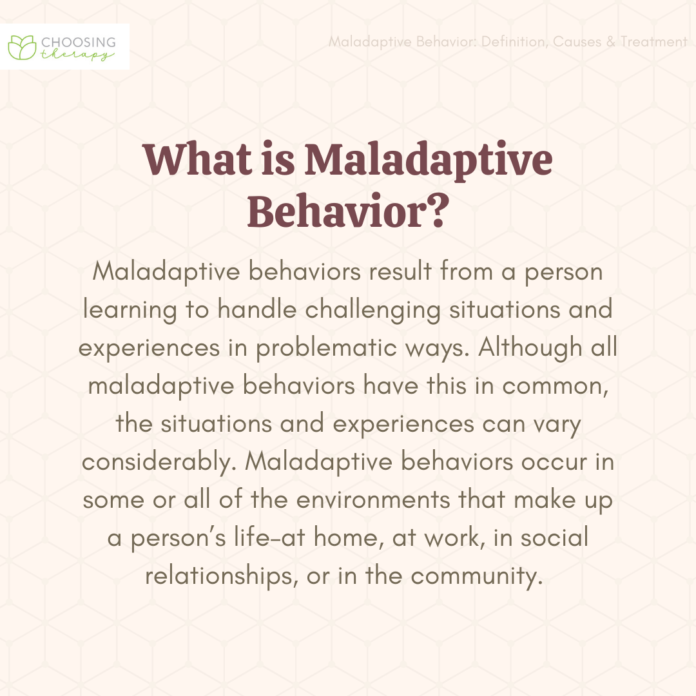Have you ever wondered if your coping strategies are helping you grow or if they’re doing more harm long-term?
Sometimes, despite immediate gratification or relief, our choices for coping are actually causing more of a negative outcome in our lives. We call these: Maladaptive Behaviors. Maladaptive behaviors can start due to a major life change, illness, stress, anxiety, or traumatic event.
Our daily lives can bring a lot of happiness and success, but there can also be moments of struggle and hardship. So when we’re faced with an obstacle we have to make a choice of how to process and tackle the problem or conflict that is in front of us.
An adaptive behavior is implemented to help us solve a problem or minimize an unwanted outcome. For example, if you’re not performing well in a course during college, an adaptive behavior would be to attend tutoring sessions, meet with your professor, or designate more time to studying. It’s not something you necessarily want to do, but you know that in order to succeed, it has to be done.
A maladaptive behavior would be not acknowledging the failing grade or the need for change. It feels out of control and uncomfortable to think about, so no action is taken, which then leads to no improvement in the situation.
Below are some common maladaptive behaviors, what their implementation looks like, and the negative impact they can cause:
Avoidance
Avoiding an uncomfortable situation or disengaging from unpleasantness can occur for temporary things over which you have no control. (i.e. avoiding going to a party when you know your ex will be in attendance). But when you continuously avoid something you shouldn’t however, it becomes a maladaptive behavior.
For example, if you haveanxiety speaking in front of people, but your job requires you to participate in monthly round table discussions and presentations of information. If you make it a habit to call in sick during those certain days, you’re not confronting the problem. Over time, the consequence may be that you end up being written up by a supervisor or losing your job.
Adaptive behaviors would be seeking help for public speaking, trying exposure therapy, joining an improv group, or finding a job that requires less presenting in front of others.
Substance Use
Whether it’s alcohol, prescribed drugs, or non-prescribed drugs, substance use can be a type of avoidance behavior. It becomes a bigger problem when you use it to ease anxiety or to disengage from your feelings.
Any escape from reality may be temporary or immediate, butusing substances to escape uncomfortable feelings such as anxiety or conflict can lead to addiction down the road, along with other health complications.
Self-Harm
If there is a difficult situation that occurs with a partner, parents, or friends, that is causing deep emotional distress, we can sometimes feel desperate just to feel the smallest ounce better.
Some individuals try and cope with stressful events through self-harm, such as cutting, burning skin, pulling out eyelashes or hair, banging your head against objects, or refusing to take necessary medications. Self-harm provides temporary relief, but the longer term only creates a different set of issues such as life–threatening injuries, permanent scars, or risk of infection. Instead, explore speaking to a therapist, journaling, or taking up a new hobby.
Every few months, it’s helpful to re-evaluate how we handle difficult situations and occurrences. Challenges change and so do we! It’s imperative that we adapt in healthy ways, even if they aren’t always the easiest or most convenient.
Book a time with a counselor today.
The post Maladaptive Behaviors: What Are They and What’s a Better Choice? appeared first on Symmetry Counseling.


